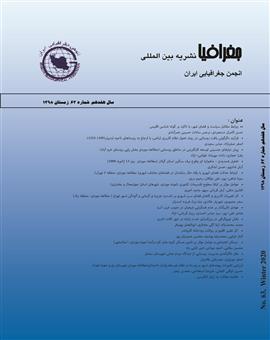بررسی و شناخت علل ناکارآمدی مدیریت روستایی از دیدگاه مردم محلی شهرستان سامان
محورهای موضوعی :اصغر نوروزی 1 , حیدرعلی غلامیان 2
1 - دانشگاه اصفهان
2 - دانشگاه پیام نور
کلید واژه: مدیریت روستایی, ناکارآمدی, توسعه روستایی, جامعه محلی, شهرستان سامان,
چکیده مقاله :
مدیریت روستایی را میتوان برنامهریزی برای روستا، سازماندهی، اقدام توسعهای و هماهنگی و نظارت بر کارهای انجامشده دانست. بررسی و شناخت نیازها، کمبودها و نارساییهای روستاییان، اقدام برای مشارکت مردم در انجام امور اجتماعی، اقتصادی، عمرانی و ... نيز بر عهدة مدیران روستایی است. شهرستان سامان با وجود توانمندی های گسترده (طبيعی و انسانی) اما با مشکلات عديدة توسعهنیافتگی روستایی مواجه است و شايد بتوان آن را در شيوة مديريت يافت. بنابراين هدف پژوهش، بررسی و شناخت عوامل تأثیرگذار بر ناکارآمدی مدیریت روستایی از دیدگاه مردم محلی است. پژوهش از نوع کاربردی و روش آن توصیفی – تحلیلی و مبتنی بر پیمایش است. جامعة آماری شامل روستائیان شهرستان سامان بوده و برای تعیین حجم نمونه ابتدا به روش نمونهگیری خوشهای پنج روستا انتخاب و با استفاده از فرمول کوکران 368 نفر از اهالی این روستاها جهت تکميل پرسشنامه به روش تصادفی ساده انتخاب و تکميل پرسشنامه صورت پذيرفت. دادههای جمعآوریشده با استفاده از نرمافزار spss24 تجزیهوتحلیل شدهاند. نتايج آزمون رگرسيون خطی نشان داد که عامل اقتصادی بهتنهایی47 % ناکارآمدی مدیریت روستایی را تبیین میکند. نتایج آزمون T نيز نشان داد بُعد اجتماعی- فرهنگی(با ميانگين 21/3)، بُعد اقتصادی(با ميانگين 18/3) و بُعد محیطی–کالبدی (با ميانگين 16/3) «تأثيرزياد» بر ناکارآمدی مدیران روستایی داشتهاند. همچنین نتایج نشان داد مهمترین عامل در بُعد اقتصادی مشکلات بودجه ای در سطح کلان، در بُعد اجتماعی – فرهنگی، عامل قومیتگرایی و اشکالات ساختاری انتخابات و در بُعد محیطی عدم توجه به محیطزیست و ناآگاهی به مسائل مربوطه بودهاند. بعلاوه نتايج نشان از تفاوت های مکانی در ابعاد مورد بررسی دارد.
Rural management can be considered planning for the village, organization, developmental action, and coordination and supervision of the work done. Also, the task of rural managers is to investigate the villagers’ needs, shortcomings, planning, and action to participate in the affairs of social, economic, development, etc. Saman County that in spite of the extensive (natural and human) capabilities faced with several problems in connection with the lack of rural, and it may be found in the management style. Therefore, this study aims to investigate and identify the factors, influencing the inefficiency of rural management from the viewpoint of local people. This study is of applied type and its method is descriptive - analytical and based on surveying. The statistics population consisted of all villagers in Saman, and they were firstly selected from among five villages to determine the sample size first by cluster sampling method and then through using the Cochran’s formula, 368 people were chosen to complete questionnaires by random sampling. The collected data were analyzed using spss20 software. The results of the linear regression test showed that the economic factor alone explains 47 % of the rural management inefficiency. The results of the t-test also showed that the socio-cultural dimension (mean 3.21), economic dimension (mean 3.18), and physical-environmental dimension (mean 3.16) had a significant impact on the inefficiency of rural managers performance. In addition, the results showed that in the economic dimension, the budgeting problems in macro level; in the socio-cultural dimension, ethnicity factor and structural failures of the elections; and in environmental dimension, lack of attention to the environment and ignorance of related issues were the most important factors. The results were also showing the place differences in the studied dimensions
